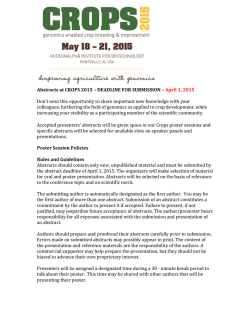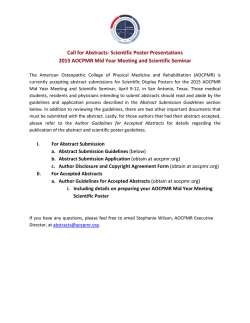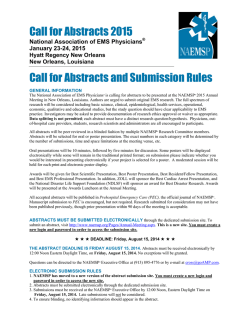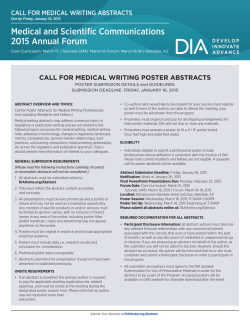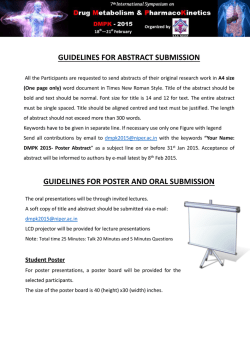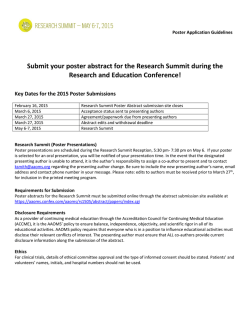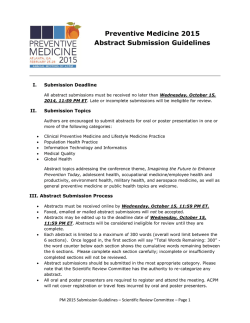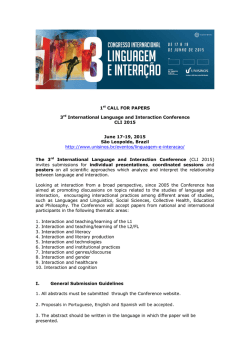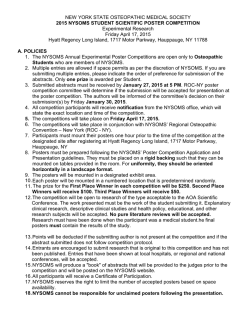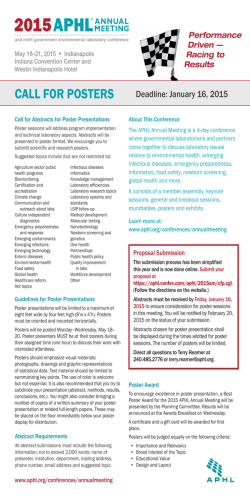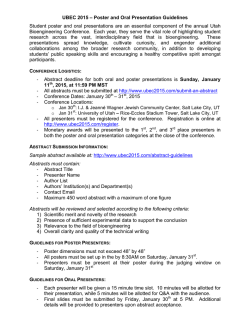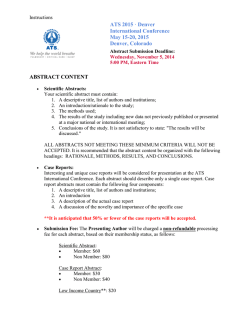
Poster Session Guidelines
General Poster Information The 2015 Poster Session is part of the AAPA’s Annual Conference. The Poster Session will be held at the 2015 Annual Conference. Posters will be on display from Saturday, May 23, to Wednesday, May 27. Authors will present their posters at varied times throughout the conference. Presentation times will be assigned upon abstract acceptance. Abstracts are categorized into four galleries: Clinical Gallery: includes clinical research and case studies or clinical reviews. Education Gallery: includes research on PA and medical student education Professional Outreach and Advocacy Gallery: includes projects and programs promoting the profession or serving patients and communities in ways not particularly clinical or research-based Student Gallery: includes research and case studies or clinical reviews by current students of PA programs General Requirements All abstracts must be submitted by a PA or PA student who can claim authorship for the project. Authorship includes involvement in the conception and design, or analysis and interpretation of data; drafting the article or revising it critically for intellectual content; and final approval of the version to be published. Authorship is not acceptable if the author only provides encouragement, physical facilities, financial support, critiques or editorial contributions. An individual may be the submitting author on no more than two abstracts, but cannot be included as an author on more than three. Authorship limitations may be waived for faculty sponsoring students. Multiple submissions of similar abstracts from the same investigator are discouraged, and literature reviews are not acceptable for poster presentation. Posters previously presented at other organizations’ poster sessions are welcome, but will not be eligible for publication. Literature reviews are not accepted for the Poster Session. The presenter is responsible for expenses associated with the submission, preparation and presentation of posters. Presenters are required to pay the registration fee for attendance at the Annual Conference. For more information on registration, please visit the Annual Conference Web page at www.aapaconference.org. Abstract General Information Authors must submit abstracts electronically no later than January 18, 2015, at 11:59 p.m. Eastern Standard Time. Selection for participation in the poster session will be based on quality of research, clarity of the abstract and adherence to the guidelines. PAs, PA faculty and PA students are encouraged to submit abstracts describing original research. Those submitting abstracts must disclose any known or potential conflicts of interest, and any source of funding must be disclosed at the time of online submission. Accepted posters may be published in the 2015 Annual Conference final program, on the AAPA website and on www.jaapa.org. Previously presented posters will not be eligible for publication. Abstract Submission and Formatting Guidelines Authors must submit abstracts electronically through the online submission process. Visit http://www.aapaconference.org/poster-sessions-research-panels/ and select “Submit your poster now.” If you have a question or experience technical difficulties, e-mail [email protected]. All abstracts must be received online by January 18, 2015, at 11:59 p.m. Eastern Standard Time. Abstracts received after this deadline will not be accepted. After filling out the online submission form, attach the abstract by one of the following methods: Type the abstract into the space provided Copy and paste the abstract from a word processing program Attach a Microsoft Office Word document to the form The abstract text should not exceed 500 words (not including the title and author information). Titles should be brief and clearly indicate the abstract’s content. Capitalize the first letter of each word, except prepositions. No abbreviations should be used in the title. Only standard abbreviations will be accepted. Special or unusual abbreviations should be placed in parentheses after the full word appears the first time. Arabic numerals should be used to indicate numbers, except when used in the beginning of a paragraph. Nonproprietary (generic) names of drugs should be used. Do not include tables, graphs, algorithms, pictures or references in the abstract. Abstracts that include these will not be accepted. Accepted abstracts will be printed as submitted. Changes to abstracts will not be accepted after online submission. Abstracts should be edited and carefully reviewed prior to submission. A common reason abstracts are not accepted is significant typographical or grammatical errors. Only the abstract’s submitting author will receive all correspondence via e-mail from AAPA. Clinical Gallery Guidelines Clinical abstract presentations are divided into the following categories: Original research - study findings or other research projects not previously presented or published Clinical report/case studies - clinical case reports or clinical vignettes highlighting unusual cases or innovative approaches to clinical problems/techniques Original research abstracts should be informative and include the following sections: Purpose - a brief statement explaining why the research was conducted, preferably limited to one sentence Methodology - materials, methodology and any analytical procedures applied, preferably limited to two sentences Results - should be presented in sufficient detail to support the conclusions (It is inadequate to state: "The results will be discussed" or "The data will be presented.") Conclusions - the authors' opinion about the meaning of the study Abstracts submitted without final conclusions or results will not be accepted. Exceptions may be made for student submissions—see Student Gallery Guidelines for full information. Education Gallery Guidelines These guidelines should be followed in addition to those listed under the Abstract Submission and Formatting Guidelines. Educational abstract presentations are divided into the following categories: Educational research - original research conducted in PA education, may include results from a grant-funded project Curricular innovation - a descriptive poster about a new teaching method, learning opportunity or other innovative educational modality introduced into the clinical or didactic phase of a PA program Educational abstracts should clearly and completely describe the project. The format of the abstract should include a general description of the objective(s), rationale, methodology, evaluation, results and conclusions. It is desirable to highlight objectives that are uniquely innovative, have impact on special populations or have value to other PA educators. It is most important to discuss measurable outcomes and data that support them. Abstracts that highlight community-campus linkages, especially those that improve the health of underserved and diverse populations, are particularly valued. Educational research abstracts will be peer-reviewed by PA educators and PAs familiar with PA education. PA education abstracts will be evaluated based on their overall quality, the level of innovation, inclusion of measurable outcomes and value to other PA educators. Posters previously presented at the Physician Assistant Education Association Annual Education Forum can be submitted for the AAPA Poster Session, but will not be eligible for publication. Authors should follow AAPA's submission guidelines. Professional Outreach and Advocacy Gallery Guidelines Participants should follow these guidelines in addition to those listed under the Abstract Submission and Formatting Guidelines. Professional outreach and advocacy abstract presentations are listed as follows: Outreach and advocacy activities designed to serve a community or patient population Outreach and advocacy activities intended to promote the PA profession Outreach and advocacy activities designed to demonstrate innovation in delivery of patient care Professional outreach and advocacy abstracts should be informative and include the following sections: Purpose: a brief statement explaining why the project or program was conducted. Description: a description of the objectives and steps taken to achieve them. Highlight aspects of the project that are innovative, impact special populations or communities, build partnerships, are sustainable, add value to the PA profession and/or are particularly timely. Describe the plan to evaluate the success of the project or program. Results: should be presented in sufficient detail to support the conclusions. (It is inadequate to state: "The results will be discussed.") Conclusions: the authors' opinion about the impact of the project or program. Student Gallery Guidelines Student poster submissions must be submitted by a PA student or PA program faculty representing student work. PA program faculty may be an author, but a PA student or students must be primary author(s). PA students include all current students of PA programs for at least part of the time from October 2014 to May 2015. If a student graduates during this time, they are still eligible to submit to the Student Gallery. Student abstract presentations are divided into the following categories: Original research - study findings or other research projects not previously presented or published Clinical report/case studies - clinical case reports or clinical vignettes highlighting unusual cases or innovative approaches to clinical problems/techniques Original research abstracts should be informative and include the following sections: Purpose - a brief statement explaining why the research was conducted, preferably limited to one sentence Methodology - materials, methodology and any analytical procedures applied, preferably limited to two sentences Results - should be presented in sufficient detail to support the conclusions. If results are not yet available, there must be a comprehensive outline of when the results will be available. Conclusions - the authors' opinion about the meaning of the study. If results are not yet available, there must be a comprehensive description of how the data collected will be used to determine a conclusion or otherwise meet the purpose of the study. Abstract Acknowledgement After you have successfully completed the submission application, you will receive an e-mail notification confirming receipt of your abstract. If you have not received confirmation within 24 hours, please contact [email protected]. Notification Decisions regarding acceptance will be made by early March 2015. The submitting author will be notified via e-mail of the final results. Authors of accepted abstracts are required to make their own travel arrangements to present and discuss their research at the Annual Conference. Attendance Policy Authors of accepted posters are encouraged to be present with their posters for discussion at the specified time during the Annual Conference. Presentation times will be assigned after abstract acceptance. Authors unable to make their presentation time will not be disqualified from the Poster Session. Authors are also encouraged to attend and participate in the other Annual Conference activities.
© Copyright 2026
